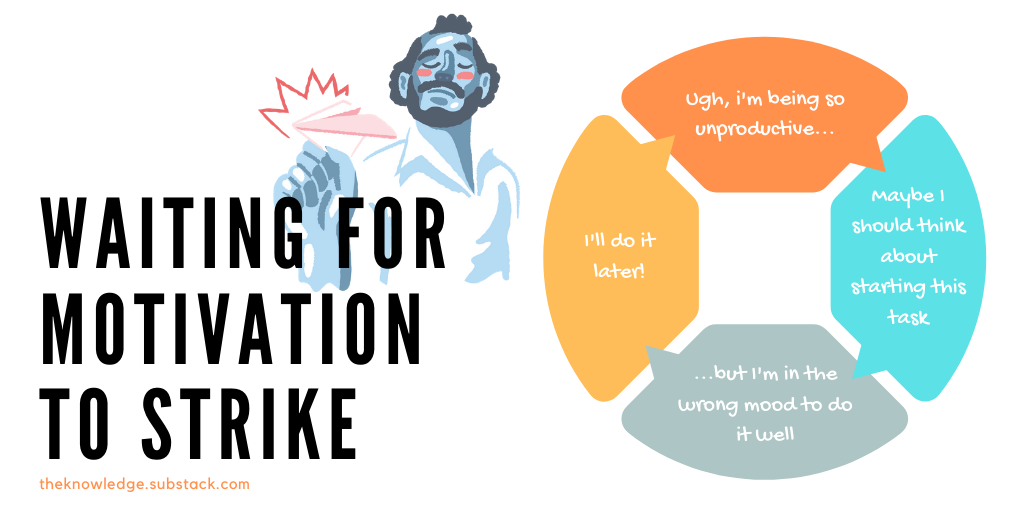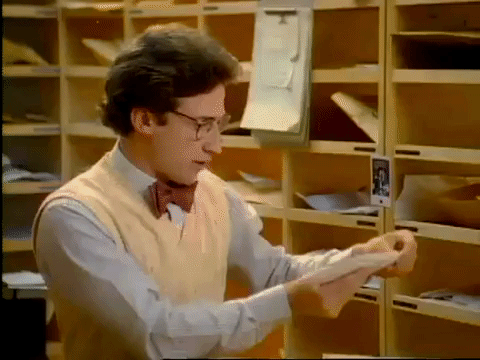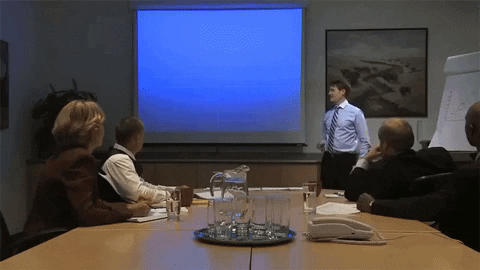The problem with motivation
If every action becomes predicated on waiting for the right mood to strike, you’ll find yourself falling into a negative feedback loop.

The second problem with motivation is that it will always need refreshing. Very often, without the additional fear of looming deadlines, motivation alone is rarely sufficient to compel us to action. You can think of any number of times you’ve told yourself you’ll go to the gym, or read that book, tidy your room, or start that diet. And even when you do it once, how often does consistency flow from that initial burst of motivation?
Motivation is great for storing and converting mental energy for a particular purpose - one burst at a time. It’s like a machine wound by a crank or lever.
However, it quickly becomes a short-term crutch. “It’s too early, my brain is still a mess”. “I haven’t eaten so my performance will be subpar”. “I have eaten too much and now I can’t concentrate”. “It’s late, so I won’t do it effectively”. All of these say “better to do it later, when I have sufficient motivation”. You’re making a prediction that a future version of yourself will once again find that perfect hormonal cocktail for one more burst of energy.
Discipline is the opposite. Because you start with function rather than reason, the reward cycle doesn’t begin until the task has commenced, but it will continue long after the task has been completed. It is an engine that, once started, can supply enough energy to keep itself running on momentum.
Put simply, if you want to be as efficiently productive as possible, remind yourself that you don't need to feel great while you're doing it - you'll feel better when it's done.
In the last few weeks, I’ve noticed some interesting reactions to my irregular updates on social media, as the endless ocean of self-isolation loses novelty and everyone settles into one of two camps: There’s a lot of people who feel like they should be doing more, or would like to be more efficient with what they’re doing, but are struggling to find the motivation to be productive. And then there is the aggressively uber-productive metropolitan elite, ramming sourdough recipes down everyone’s necks in-between guitar practice, yoga, and their sixth book of the day.
I get it. This period can and has been insanely draining, but I’d like to share a few things that have helped me get back in control and feeling both happy and productive.
My morning ritual
Not long ago I wrote an issue about how I was learning to live on 24 hours a day, which ironically is one of the most popular issues I’ve written. I promised to return with further updates so here we are.
At first glance, my new post-COVID morning schedule probably verges on the ridiculous, but it makes me happy and it works for reasons I'll explain later. This is it:
Wake up: flexible, based on when I sleep - 4:30-5:30
Language practice: Mandarin (for ~10yrs on/off) - 5:30-7:00
Walking: on average 8.5k (maintaining self-isolation) - 7:10-9:10
Reading: audiobooks while walking (2-3x speed) - 7:10-9:10
Work: after showering etc - 9:30
Now before you dismiss me as a RISE’N’GRIND merchant, I do all of these things for two reasons:
- They make me happy. The regularity keeps me sane, while also being both healthy and productive.
- I know I am a woeful procrastinator who easily falls into deep ruts, and needs a comprehensive system of active and passive nudges to keep me in line.
I set up my mornings so that most of the things I feel happy about achieving happen almost by accident. It’s a subtle magic, somewhere in the void between discipline and preparation.
Step one for anyone reading this is to ignore all the things I personally do, as well as the times at which I do them. I can’t emphasise enough how irrelevant people’s obsession with such things are. I don’t want anyone feeling put off by the amount I do, but I know some find it a useful indication of what’s possible. Aside from that, forget about what others are doing. Don’t let comparison steal your joy. You will not die if you cannot make banana bread by sundown.
The sole aim should be to achieve your personal goals as efficiently as possible, in a way that brings you joy and fulfilment.

Choose your fuel
On a basic level, humans are creatures of habit and stasis. Your body won’t be going anywhere until it is provided with one of two things: sufficient motivation, or sufficient discipline.
From an evolutionary perspective, that motivation could manifest in a gazillion ways. Motivation to eat, seek shelter, cleanse, mate, etc. But as society has evolved our output has changed significantly.
Our drive to survive which once depended on catching enough meat or harvesting enough grain to last a winter, has been replaced with a variety of largely sedentary tasks, and our supermarkets are customarily filled with a variety of food. As scientific advances in farming and food storage shifted societies from scarcity to abundance, we’ve also got a lot better at entertaining and distracting ourselves. Everything from the bread in your fridge to the phone in your hand has been engineered to procure further consumption.
This brings me back to our key drivers. Motivation is based on impulse and emotion, and where productivity is concerned it is often interwoven with the flawed assumption that a particular mental or emotional state must be reached in order to complete a task effectively. I think this closely relates to an emerging school of thought that teaches you must do a bunch of set activities to “find your zen”, which will then enable you to engage in tasks that must be completed.
Discipline, conversely, disengages the task at hand from requisite feelings or moods. Discipline does what must be done, and the successful completion of a task usually brings about the same rush of endorphins that chronic procrastinators believe is necessary to even begin a task.
There’s a really interesting study by Dan Ariely where students were tasked with proofreading three passages. Group 1 got a weekly deadline for each passage. Group 2 got a single deadline for all passages, and Group 3 were allowed to set their own deadline.
Group 2 were the worst performers. The distant deadline proved an insufficient motivation without the compelling fear of a deadline each successive week. However, the group that set their own deadlines were the next worst performers. We frequently make faulty predictions of our future selves, particularly where it involves finding the motivation to engage with tasks. You’re expecting your future self to do something you won’t even do today.
Motivation starts by asking why. Why am I doing this? Is there a reward? Is the reward sufficiently motivating right now? But the level of motivation you need to start a task is often far higher than the motivation of the final reward, especially if it is distant.
Discipline starts with what. What must be done? Is this necessary? The why is a secondary question, but you’ll often find that the reward remains the same.
The difference is timing. Should you wait until you’re in Olympic form before you start training, or do you train to reach Olympic form?
Stop pretending broccoli is delicious
One of the most important tools in overcoming inefficient production is the need to be honest with our present selves. Stasis is comfortable. It’s okay to admit that. And often, the things we want to substitute stasis for, lack the inherent goodies to compel immediate action.
Cake doesn't taste better than broccoli because you lack motivation, and no amount of zen will make your bed less inviting. You don't still hate your job because you lack motivation. Sometimes the things you need to do just suck, and the only way to overcome them is with discipline and training. Nobody said the carrot at the end of the stick was tasty. If you sit and wait for the right cocktail of random hormones to do something, that moment may never come.
I do believe we can find moments of joy in mundane and unpleasant tasks by focusing on gratitude and using time for multiple ends, but I will discuss that in next week’s issue.
Focus on cultivating a self-perpetuating discipline. By building discipline you will continue to get things done even when you don't feel like it.
I recognise it’s not always as simple as saying “pick up your mat and walk”, so let’s break down the function of getting things done.

Make mountains from molehills
Building discipline comes through a combination of habit and momentum. Start with tiny habits (going big is the easiest way to fail), then reinvest that small discipline into progressively bigger changes to your routine, and building a positive feedback loop.
Remember that your body is no fan of change, and anything too drastic is likely to be met with resistance. That’s usually why we fail with long-term personal goals. The likelihood is very low that you will suddenly wake up tomorrow and automatically be your ideal person.
If you need to tidy your space and you don’t have the shared energy and accountability of someone to help you, just start with tidying a single corner. Make a tiny section as pretty as possible. It could take 5 minutes or an hour but after that, just leave it. Return tomorrow at the same time and tackle another part. Soon you will have developed a habit of consistent, regular maintenance which will last far longer than a burst of sudden motivation will have taken you.
My morning walks are a great example of this. Most days I can walk anywhere from 8 to 14km, but I definitely didn’t start that way (FYI that 14km walk was not wholly intentional, I almost died). I started walking because I wanted to explore my area more, so I opened Google maps, jabbed at a spot that seemed sufficiently far away without knowing the exact distance, and walked there. After a few days, I’d start looking at other roads I passed and trying them, and then attempt to find my way back to the route. Every week I’ve progressively added to the route, and the continual sense of discovery and mastery keeps it exciting. Your efficiency with the task also improves as you go, and as I walk faster I increase the distance I can cover in the same time.
Create a series of fortunate events
This leads me back to my morning schedule. You see, there’s plenty of things my ideal self would like to accomplish on any given day, but I’ve realised if I start my day saying “I will do it at some point”, it will never happen. So I started with a few small goals in all the areas I wanted to progress, and tied them into a chain of events. The progressive climax of each completed task means that by the time I’m done, I’m both happy and energised.
Don’t try to do too much, and don’t tie yourself to unrealistic expectations. I know that I will almost never wake up at a fixed time because of my alarm, so I set about 6 just in case, but usually wake up before all of them. Here’s how:
Wake up: I start by keeping my coffee mug in my room the night before. When I wake up in the middle of the night I check the time, and if it’s within my range of reasonable time (4:00-6:00, up to 8 on the weekend), I will take the mug as I leave the room, go to the bathroom, and then go straight downstairs to make coffee. I’m already holding the mug in my hand. There’s no excuse now.
Language practice: Again, the night before I’ll remove my laptop from my desk and put my workbook/notebook on the desk. Everything is ready. I start with Duolingo on my phone because there’s no way I can jump straight into a textbook at 4am. Also if I wake up at 4 I’ll probably waste an hour on Twitter (instead of during the day) and save all my tweets as drafts for publishing later. Now for study (5:30-7:00), I only need to work through 1 chapter a day and write 5 lines of Chinese. That’s reasonable.
Walking: It’s 7am. The sun is now coming up. I’ll have folded and set out my exercise clothes the day before. I’m tired of studying now and know that if I want to get back in time for 9, I’ll need to change and leave as quickly as possible. I walk to one of two destinations but frequently change the route to get there. One is about 8k, the other is about 10k, and I pick depending on how I feel. It always feels new. I enjoy the quiet solitude, the plants and birds etc. (I live in a very suburban area near fields and forests).
Reading: The entire time I spend walking I’m also listening to audiobooks. I promised I’d read more this year and rarely have the patience to drag myself away from a screen during the day and just focus on reading. I’ll still attempt it, but this way I guarantee I read a minimum amount. Listening at 2-3x speed I’ll finish at least one book a week. Sounds like a lot but it’s built into my schedule now so it happens unintentionally. It also makes walking so much more exciting because I’m learning/exploring new worlds.
Work: I walk as fast as possible because it’s meant to be exercise. By the time I get back I’m sweaty and need to shower. If I stayed at home I might have rolled around and pushed this till midday or beyond. Now there’s urgency. I’m aiming to be ready to work by 9:30, but sometimes it’s 10 and that’s ok.
My workday itself can have varying levels of productivity but the walks are really energising so I’ve been getting a lot more done in the morning. Also, because I’ve set aside about 4-6 hours of “me time”, I always feel a little fulfilled even on days I end up being less productive. I know I’ve always done the bare minimum, and that minimum is more than I’d have achieved if I left it all to chance and sudden bouts of motivation. As you can see, all I’m doing is acknowledging and compensating in advance for my many inefficiencies. There’s no special magic other than preparation and disciplined momentum. I’ve also started wearing proper clothes every day. Finding joy and variety in small things goes a long way when you’re stuck indoors.
Because of my exercise and early wake times, I’ll start getting tired around 9:30pm, and so the self-perpetuating cycle of accidental productivity continues. I’m now trying to work on building a useful evening routine, but it will mostly be about self-care and reductivism.
In next week’s issue, I’ll go further in-depth into how to cultivate discipline, how to set up a system of nudges that work for you, and I’ll share more practical tools you can use to achieve that.
I’ll leave you with one of my favourite quotes from Seneca:
“Putting things off is the biggest waste of life: it snatches away each day as it comes, and denies us the present by promising the future. The greatest obstacle to living is expectancy, which hangs upon tomorrow and loses today. You are arranging what lies in Fortune’s control, and abandoning what lies in yours. What are you looking at? To what goal are you straining? The whole future lies in uncertainty: live immediately.” – Seneca. On The Shortness of Life
If you have any other super tips for staying productive and getting the most out of each day, I’d love to hear your thoughts. Reply via email, leave a comment or send me a tweet!

This week on The Knowledge
This week on the podcast I share a conversation with Ade Onibada, a journalist, news reporter and factual producer. We spoke about her journey into journalism and progression through the industry, and then on a macro level about the role of media in society, the widening gap between the right and the left, and the importance of maintaining journalistic integrity.
You can listen to the episode now on ‘The Knowledge’ wherever you listen to podcasts!

Reading list 11
Books I’ve read/seen/will impulsively buy and add to my “to read” shelf on Goodreads:
- I managed to read My Sister, the Serial Killer by Oyinkan Braithwaite in a single morning while walking (thanks to Audible (at 2.5x speed)) and it was amazing. I’d definitely recommend the book, but doubly so the Audible narration by Weruche Opia. Dami won’t let me forget that she recommended this first, so credit where it’s due.
- The Good Immigrant by Nikesh Shukla. Wishlisted. On recommendation from Temi, a newsletter reader.
- Michelle made Underground Railroad by Colson Whitehead sound amazing, which made it an easy impulsive purchase. To be fair, it did win a Pulitzer (inter alia) and is already being adapted as a TV series, so eyes peeled for that.
Things I’m loving
Films and shows:
- The Last Kingdom - I’ve only just watched the first episode but WOW. I’m sold. Apparently it started in 2015 so as usual, I’m late to the party.
- Divergent - I finally re-watched this for the first time in years and I don’t love it any less. It was good to remember how well the franchise kicked off because things started crumbling by the third instalment.
Resources:
- Patch - I couldn’t become a dog dad before shelters closed due to coronavirus so I’ve settled for becoming a plant dad. Rachael, a reader, introduced me to Patch and an hour later my three new sons were on their way. I’m trusting her judgement as the proud owner of +40 plants, but Patch has so much useful info for new parents. You can get also 15% off your first order here 🌱
- The Infinite Monkey Experiment - I’m sure many of you may have heard the theory that given an infinite amount of time, monkeys with a typewriter could eventually write the complete works of Shakespeare. Now it’s being put to the test, and you can watch it live! Instead of monkeys, it’s a computer but it’s still just as cool. There’s a computer playing random notes at random intervals to see how long it takes to accidentally play complete songs. As a reference, it took 61,713 attempts for it to play Still Dre and 155,723,718 attempts to play Sweet Caroline.✓
Let me know if you have any suggestions for next week. Feedback is welcome too! Email me or drop me a tweet here.
Until next time!!







